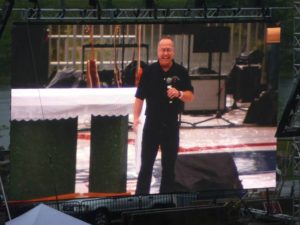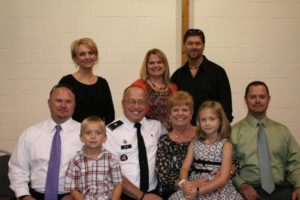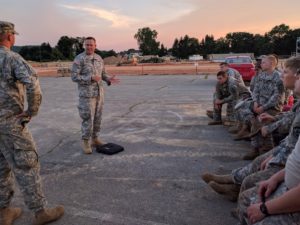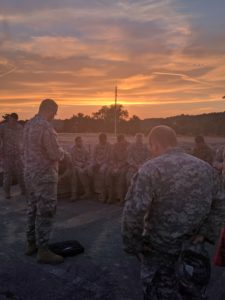
Rev. Dr. Bruce Reed
If you’re like me, when you think of “military chaplain,” the image of the 4077th M*A*S*H’s Father Francis Mulcahy comes to mind. And as it turns out, Father Mulcahy is actually a pretty good model for chaplaincy. I know this because another military chaplain, the Rev. Dr. Bruce Reed, who wrote a D.Min paper on the fictional chaplain, told me so.
Father Mulcahy was something of a gentle soul who was frequently unsure of his own value, but who stood firm in faith and practice, and truly was a zealous bearer of the kingdom. Dr. Reed, who served more than two decades as a full-time chaplain in the West Virginia National Guard, including a year’s deployment in Iraq and another in Afghanistan, vouches for the character of chaplains: “When I see a military chaplain, I know the struggle Satan puts them through, trying to keep them from being a chaplain.”
Although he retired as a colonel from the U.S. Army and a brigadier general from the West Virginia National Guard, Dr. Reed didn’t start out thinking he’d be a chaplain. He’d been serving West Virginia United Methodist churches for a dozen years and had a young family when he was invited by the chaplain at Camp Dawson to consider military chaplaincy…multiple times!

Rev. Dr. Bruce Reed, center
Bruce “had a long conversation with the Lord,” and was supported by his family and his church to take steps in a new direction in ministry. He would have no idea that those conversations would lead him around the world, offering him the opportunity to be in close contact with people who otherwise might never darken the door of a church.
One time Chaplain Reed was doing rounds, visiting soldiers in foxholes, because it was a Sunday. One soldier gladly welcomed him, but a second soldier (let’s call him “Johnson”) was quick to tell him he didn’t buy that religious stuff. He told Reed how he hated the church, and how badly the church had treated him. “I’m not here to talk to you about the church,” Reed said. “I’m here to tell you about the Lord that I know. It’s about relationship.”
Half an hour later “Johnson” was coming into a new relationship with God. A year later, he found the opportunity to connect with Reed again: “Do you remember me? A year ago, you dropped into my foxhole and you introduced me to the Lord. You prayed with me and then you recommended that I find a church. I took your advice, and I’ve been in that church ever since. You helped me make the best decision I ever made.”
Reed said you don’t often find those opportunities in the local church, but as a chaplain? All the time. “It’s like a local pastorate on steroids.”

Rev. Chip Bennett, speaking
Rev. Chip Bennett agrees. Unlike Dr. Reed, who was a United Methodist pastor before becoming a chaplain, Bennett has been in the National Guard since he was 19, and it was in this setting that he discerned his call to ministry. “Soldiers don’t seek out a chaplain because things are going well,” Bennett says. “Soldiers seek a chaplain because their life is off the rail. A lot of soldiers aren’t connected to a local church. Chaplaincy offers a unique opportunity to really offer God’s presence to people who are under unusual stress.” Eighteen years after becoming a soldier in the West Virginia National Guard, Bennett is now also a provisional elder in the West Virginia Conference, appointed since 2013 to Bellemead UMC in Point Pleasant. He continues to serve in the Guard one weekend a month plus two weeks a year.
Bennett brings up several other interesting aspects of his unique position employed by both The United Methodist Church and Uncle Sam: his health care is covered by the military, instead of by the local church, and he has both training and first-hand leadership experience offering recovery after things like the floods that affected so many in West Virginia in 2016 and 2017.
Two frustrations Bennett shared about chaplaincy in the National Guard are that he’s only with his soldiers once a month, and he’s the only United Methodist chaplain currently in the WVNG*. Reed said that commanders often prefer Methodist chaplains because they work so well with soldiers of many different faith backgrounds – or no faith background – where chaplains of other denominations frequently either focus on soldiers of their own kind, or try to use their position to proselytize.
 Bennett strives to give his soldiers the ministry of presence: “If soldiers know their chaplain,” he says, “they’re more likely to reach out when they’re really in need.” Bennett also noted how familial the relationships become in the National Guard, and that fuels his passion to be there for them.
Bennett strives to give his soldiers the ministry of presence: “If soldiers know their chaplain,” he says, “they’re more likely to reach out when they’re really in need.” Bennett also noted how familial the relationships become in the National Guard, and that fuels his passion to be there for them.
Where soldiers have needs that chaplains can meet, chaplains have needs that congregations can meet. Reed encourages congregations to view chaplains as missionaries and give them and their families the same kind of support they’d give them. Congregations that want to get involved with military service members and their families in times of need are encouraged to get in touch with WVNG’s Partners In Care program.
By becoming a Partners In Care church, a congregation can provide meaningful service to active WV soldiers and their families…in effect, becoming local extensions of the WVNG’s chaplaincy program, helping to fill in some of those gaps Bennett mentioned. To find out more about becoming a Partner in Care church, contact the Chaplain’s Office in Charleston at (304) 561-6490.
Reed had one other request for me: “Tell them about Bill Kniceley. When Bill started in the National Guard, he was the only chaplain in the program. He recruited six or seven chaplains in his time, and he built the chapel at Camp Dawson, even while rebuilding his own church after a fire. You want a chaplain like Father Mulcahy? That’s my mentor, Bill.”
The United Methodist Church in West Virginia is a dynamic network of faith communities passionate about sharing the hope and love of Christ, in local churches and military camps, in coffee shops and foxholes, in hospitals and on campuses, and in police stations and fire companies and more. What is your connection? What is your story?
*The reader may note that provisional elder Jenna Wright Moon is a chaplain in the US Army Reserves. I hope to interview Rev. Moon another time.
Kerry W. Bart was ordained an elder in Eastern Pennsylvania in 2005. He was appointed to Barboursville First UMC in 2013 and is now a full member of the West Virginia Conference. Kerrfunk1@gmail.com www.FirstChurchBville.com